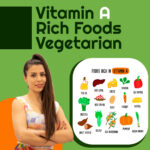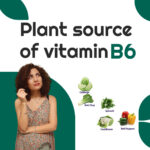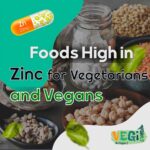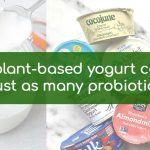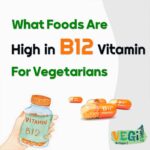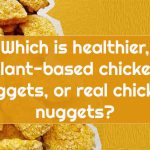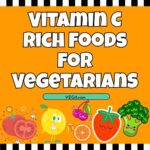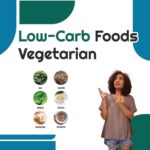Biotin Rich Foods for Vegetarian
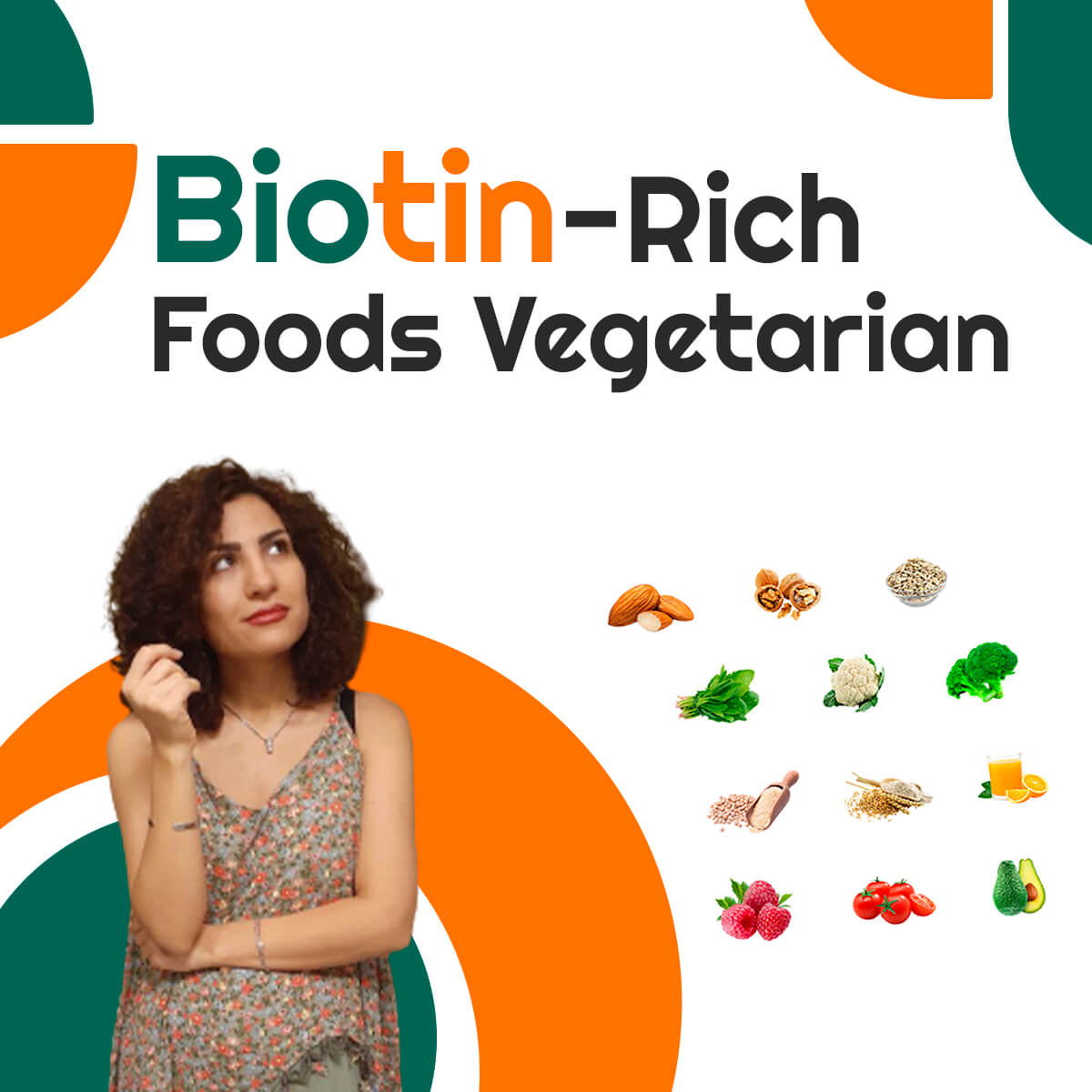
As a vegetarian, have you ever experienced brittle hair, dry skin, or soft nails? These issues might be due to a lack of biotin in your diet. Biotin, or vitamin H or coenzyme R, is essential for maintaining healthy hair, skin, and nails. This water-soluble vitamin is involved in several critical processes in the body, such as energy metabolism, cell growth, and brain function.
Although biotin is found in many foods, it’s essential for vegetarians who might not consume enough biotin-rich foods. This article will give you the scoop on biotin, how to get more, and which plant-based sources contain the highest Vitamin B7.
In this article you will read:
Ever wonder why your hair is so brittle and breakable? Why your skin gets itchy and dry?
Or why do your nails feel soft and lose their natural sheen? You need to get more biotin to support these things.
Don’t worry, that’s okay—because there are still plenty of non-food ways to get biotin into your diet. This article will give you the scoop on biotin, how to get more, and which plant foods have the highest Vitamin B7(Biotin).
Discover the wonders of biotin, a B vitamin essential for healthy hair, skin, and nails. Learn about its sources, benefits, and more!
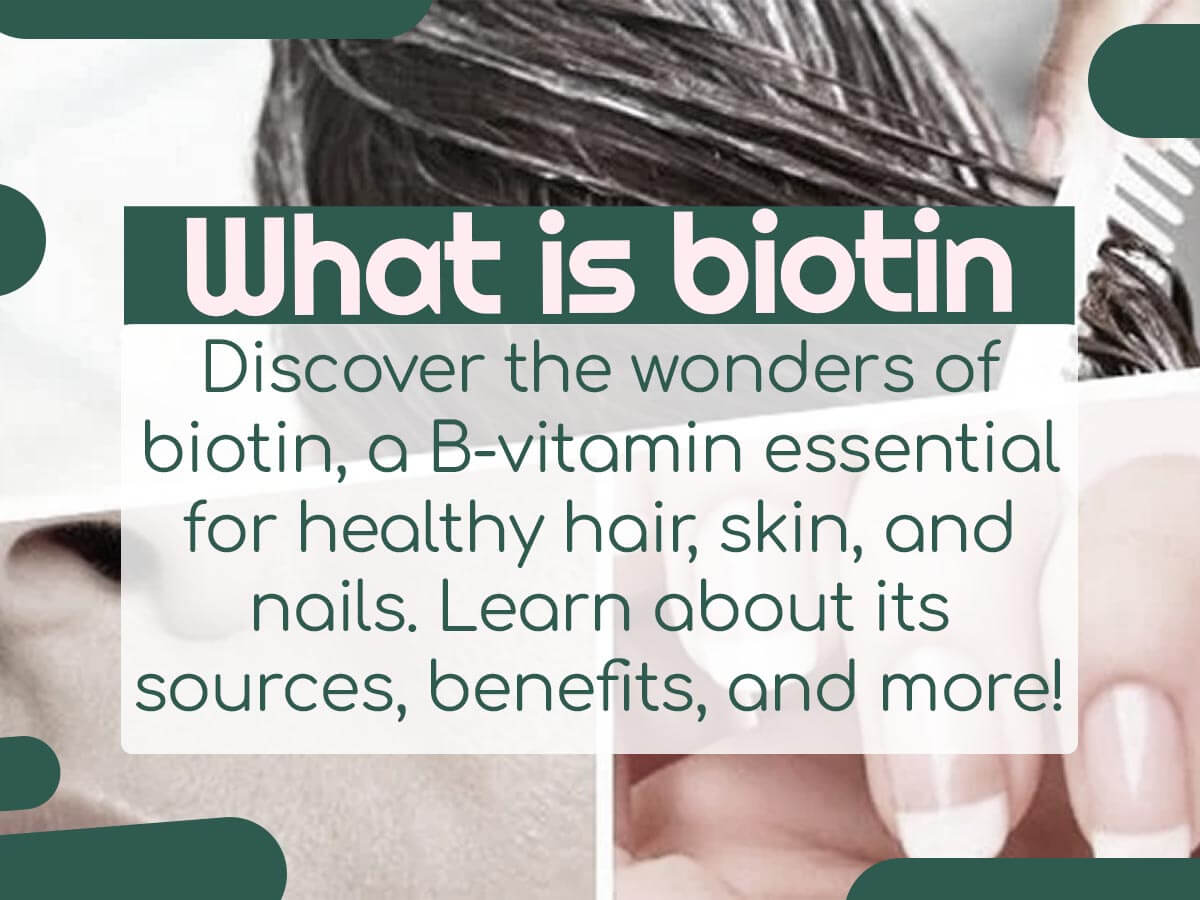
What is Biotin?
Biotin is a vitamin that dissolves in water and is found in many foods. It is essential for keeping your hair, skin, and nails healthy. Biotin is one of the eight vitamins people need to eat to stay healthy.
Biotin, or vitamin B7, is one of the eight essential vitamins our body requires to stay healthy. Biotin plays a vital role in forming healthy cells, maintaining a healthy immune system, and keeping hair, skin, and nails in good condition.
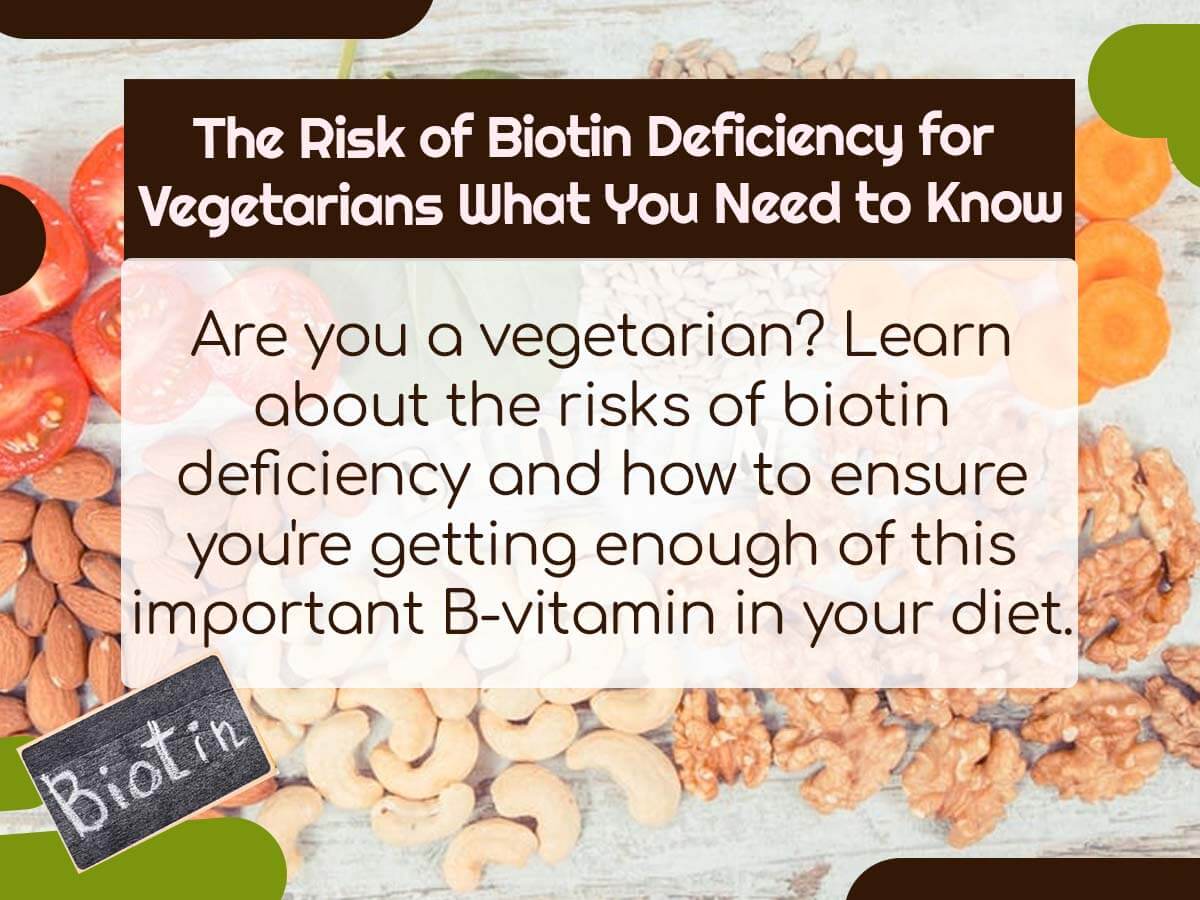
Signs of deficiency in vitamin B7(Biotin)
Biotin deficiency can cause dry, brittle hair, nails, and skin. In addition, low levels of biotin may lead to thinning hair, dry scalp, and thinning nails. It’s best to get biotin from foods rather than supplements, as most foods naturally contain small amounts of this vitamin.
Many people are unaware their skin needs biotin to stay healthy and hydrated. Your skin may become dry and lackluster if you’re deficient in this vital vitamin. Biotin deficiency can also lead to hair loss in both men and women.
It’s also possible for biotin deficiency to cause depression or extreme fatigue.
Children with a biotin deficiency may develop rickets and poor bone development. Therefore, consuming an adequate amount of biotin in your diet is essential.
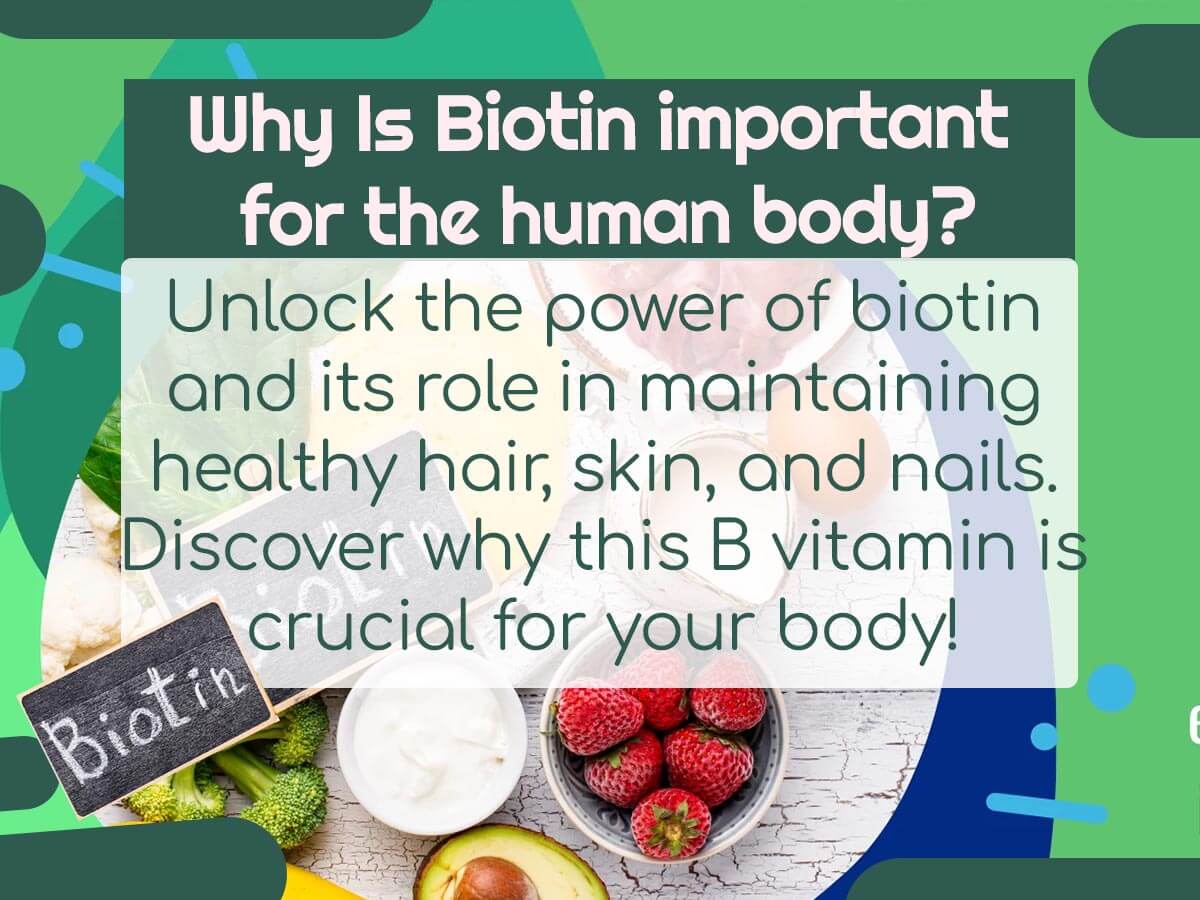
Why Do Vegetarians Need Biotin?
Specifically, biotin can provide several benefits for vegetarians, including:
- Biotin is an essential nutrient that helps keep your body healthy by supporting cell growth, metabolism, and brain function. It’s found in foods such as beans and nuts and certain foods such as yeast extract and biotin supplements.
- Having the right amount of biotin is essential for staying healthy. It helps your hair, nails, and skin grow well, energizes you, and helps your digestion work as it should.
- If you are a vegetarian and have an irregular diet or use certain medications that have led to hair loss and reduced vitamin B7 in your body. In that case, you should seriously consider biotin in your diet.
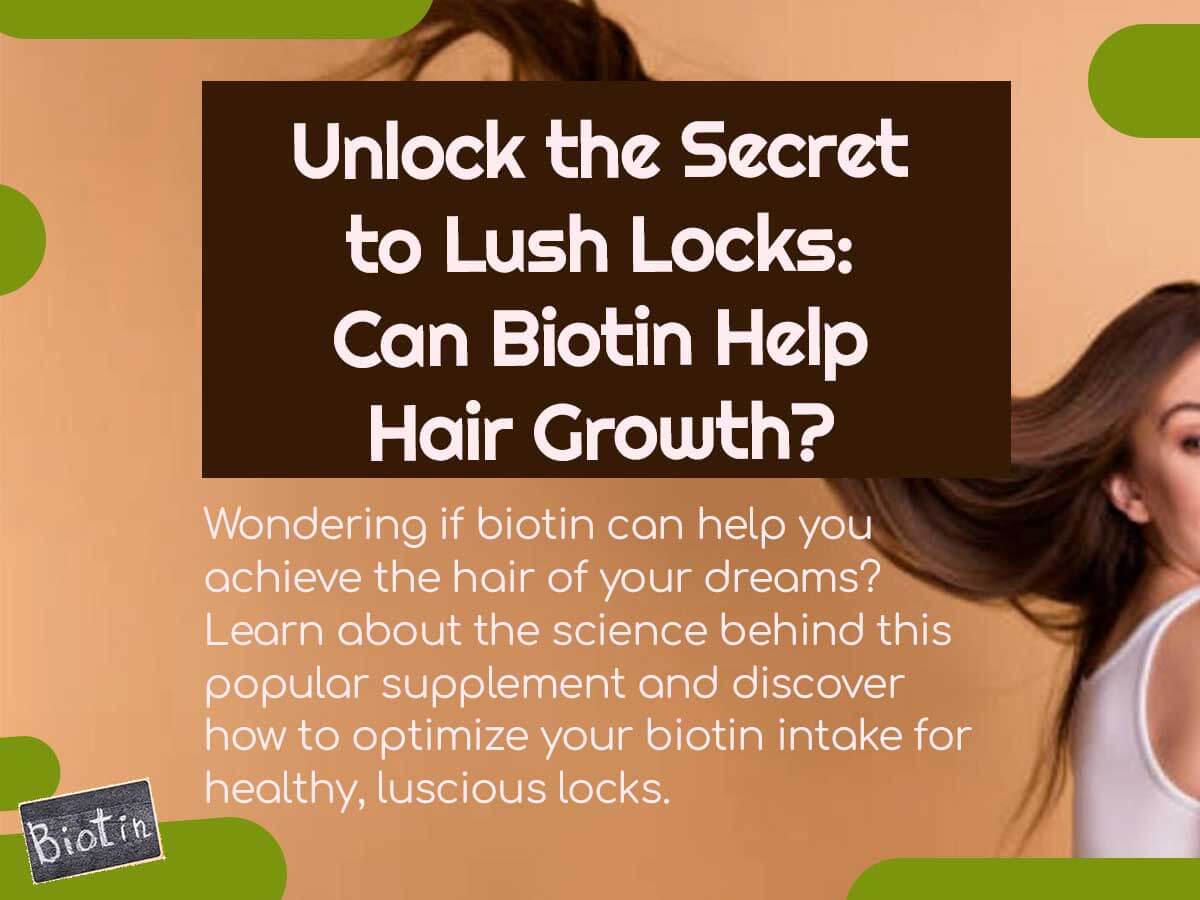
The Power of Biotin: How Vegetarians Can Boost Their Health and Wellbeing
As a vegetarian, it’s essential to understand the role of biotin in our diet and how it can benefit our health.
Biotin, also known as vitamin B7, is necessary for metabolizing fats, proteins, and carbohydrates, making it a crucial nutrient for overall health and wellbeing.
Specifically, biotin can provide several benefits for us vegetarians, including:
Promotes healthy hair, skin, and nails: Biotin is vital in growing and maintaining healthy hair, skin, and nails. It can help prevent hair loss, promote growth, and improve skin and nails’ overall appearance and health.
Supports cognitive function: Biotin is essential for brain health and can help improve cognitive function. It has been shown to enhance memory and learning, making it a necessary nutrient for students, professionals, and anyone looking to improve their brain function.
Improves glucose metabolism: Biotin can help improve glucose metabolism and regulate blood sugar levels, making it beneficial for vegetarians at a higher risk of developing diabetes.
Boosts immune system: Biotin supports the immune system and can help improve the body’s ability to fight infections and diseases.
You can improve your overall health and wellbeing by incorporating biotin-rich foods into your diet.
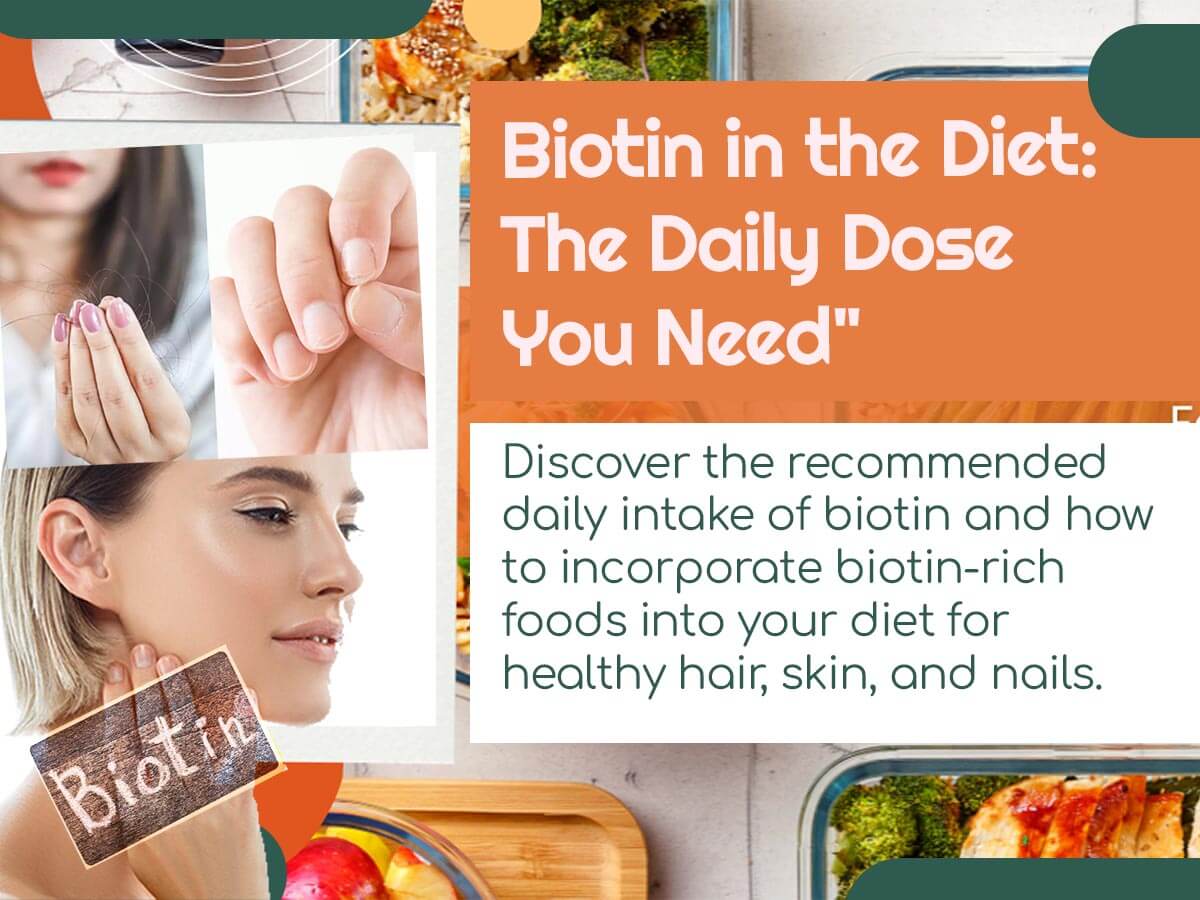
Biotin in the Vegan diet – How much biotin do we need daily?
Biotin is a water-soluble B vitamin that’s naturally produced by the body. As you age, your need for biotin may increase.
Your recommended daily amount of biotin depends on your age and sex. The RDA is 1.8–3.2 milligrams per day (mg/day) for most people. People who have liver disease or diabetes should check with their doctor before taking a supplement to make sure their bodies can tolerate it well.
| Age | Recommended nutrient intake of biotin set by FAO/WHO |
| 7-12 months | Six micrograms per day |
| 1-3 years | Eight micrograms per day |
| 4-6 years | 12 micrograms per day |
| 7-9 years | 20 micrograms per day |
| 10-18 years | 25 micrograms per day |
| 19+ years | 30 micrograms per day |
| Breastfeeding | 35 micrograms per day |
FAO/WHO: The UN Food and Agricultural Organisation and World Health Organisation.
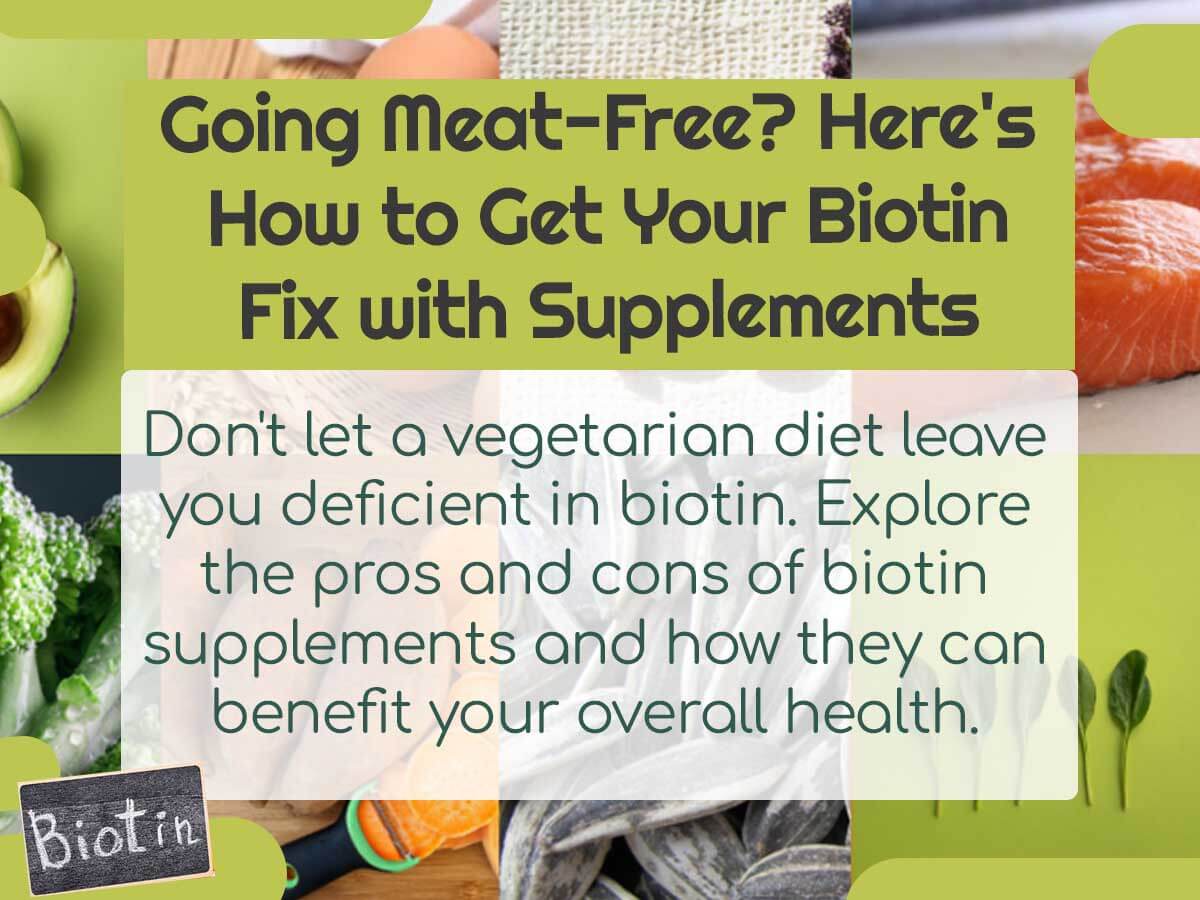
How can vegetarians get biotin?
Suppose you have a biotin deficiency during your vegetarian diet. You can get enough biotin by eating biotin-rich foods such as bananas, soybeans, avocados, and almonds. However, if you have a severe biotin deficiency and experience symptoms such as brittle nails or severe hair loss. You can take biotin supplements in tablet or powder form.
Be sure to test before taking any supplement, and consult your doctor to choose the best biotin supplement for you.
However, it’s important to note that cooking can destroy some of the biotin in food, so it’s best to eat these foods raw or lightly cooked.
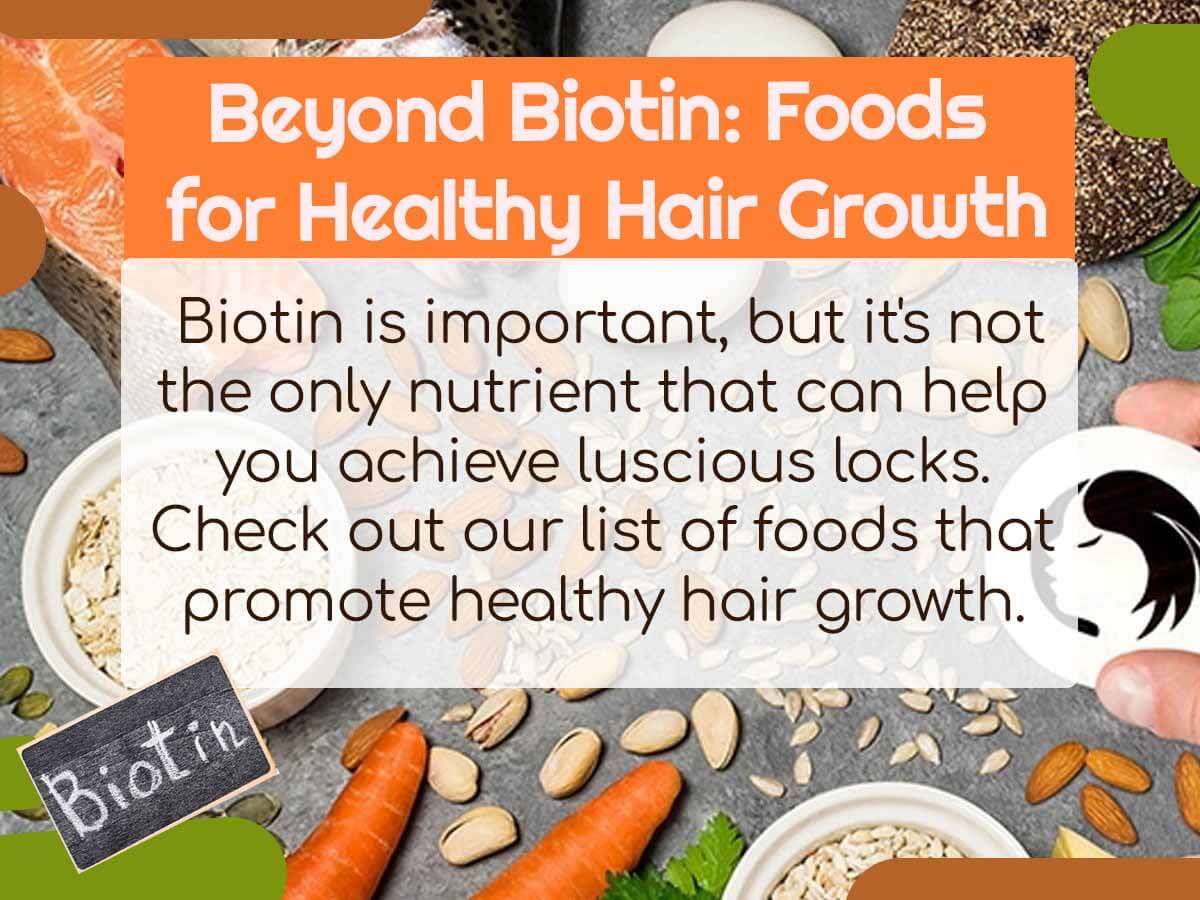
The most common foods containing biotin for vegetarians
| Food | per serving |
| Sunflower seeds, roasted, ¼ cup | 2.6 mcg (9% DV) |
| Sweet potato, cooked, ½ cup | 2.4 mcg (8% DV) |
| Almonds, roasted, ¼ cup | 1.5 mcg (5% DV) |
| Spinach, boiled, ½ cup | 0.5 mcg (2% DV) |
| Broccoli, fresh, ½ cup | 0.4 mcg (1% DV) |
| Oatmeal, 1 cup | 0.2 mcg (1% DV) |
| Banana, ½ cup | 0.2 mcg (1% DV) |
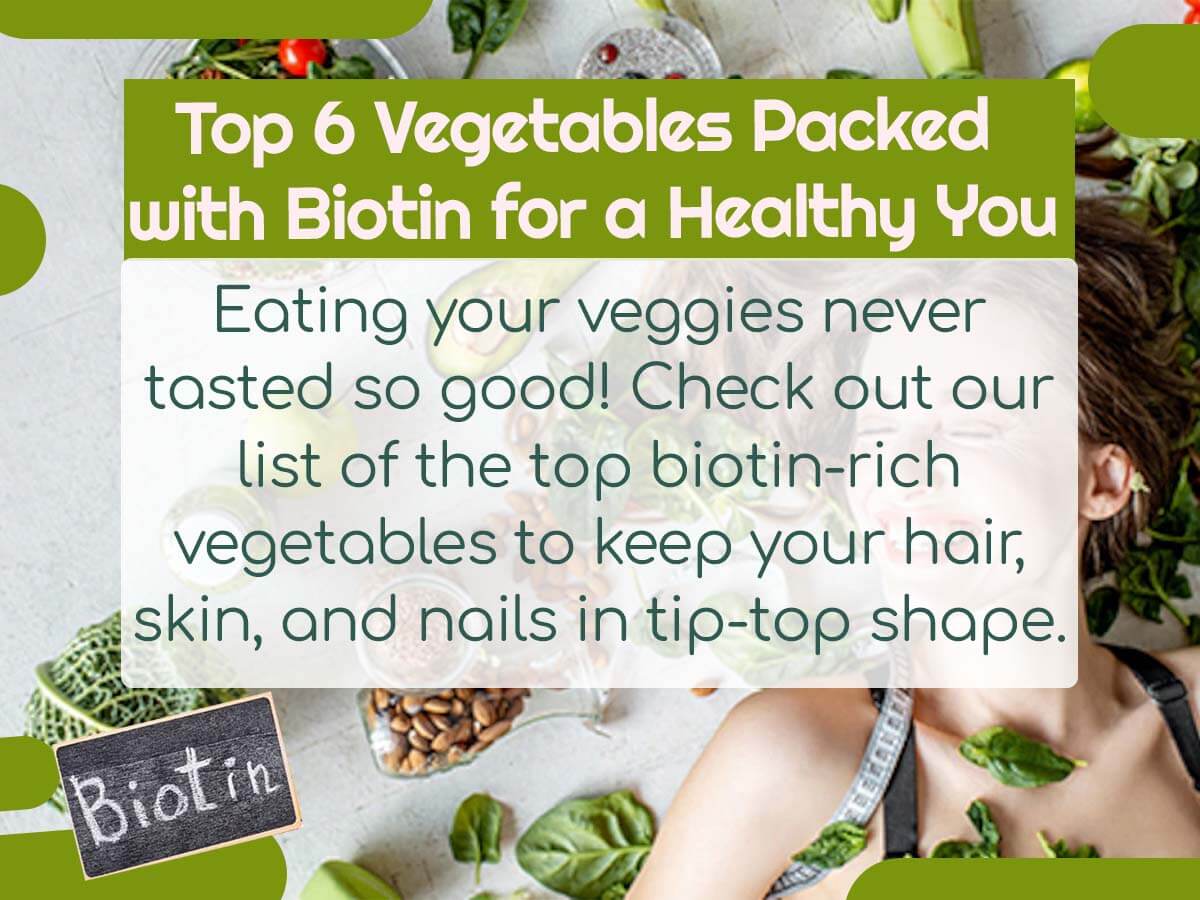
Vegetables rich in vitamin B7 (biotin)
Below I have listed some vegetables that can help reduce the risk of heart disease and diabetes in addition to providing the biotin needed by the body:
- Cauliflower: One cup of raw cauliflower provides up to 4 mcg of biotin [2].
- Broccoli & Cabbage: These are good sources of biotin..
- Spinach: A 1/2 cup (64 grams) of boiled spinach offers 0.5 micrograms of biotin [2].
- Sweet potatoes: A 1/2 cup (125 grams), cooked, provides about 8% of the Daily Value (DV) for biotin [1].
Overall, sweet potatoes and spinach are the best sources of biotin among these vegetables.
References:
[1] The Top 10 Biotin-Rich Foods
[2] 15 Biotin-Rich Foods to Add to Your Diet
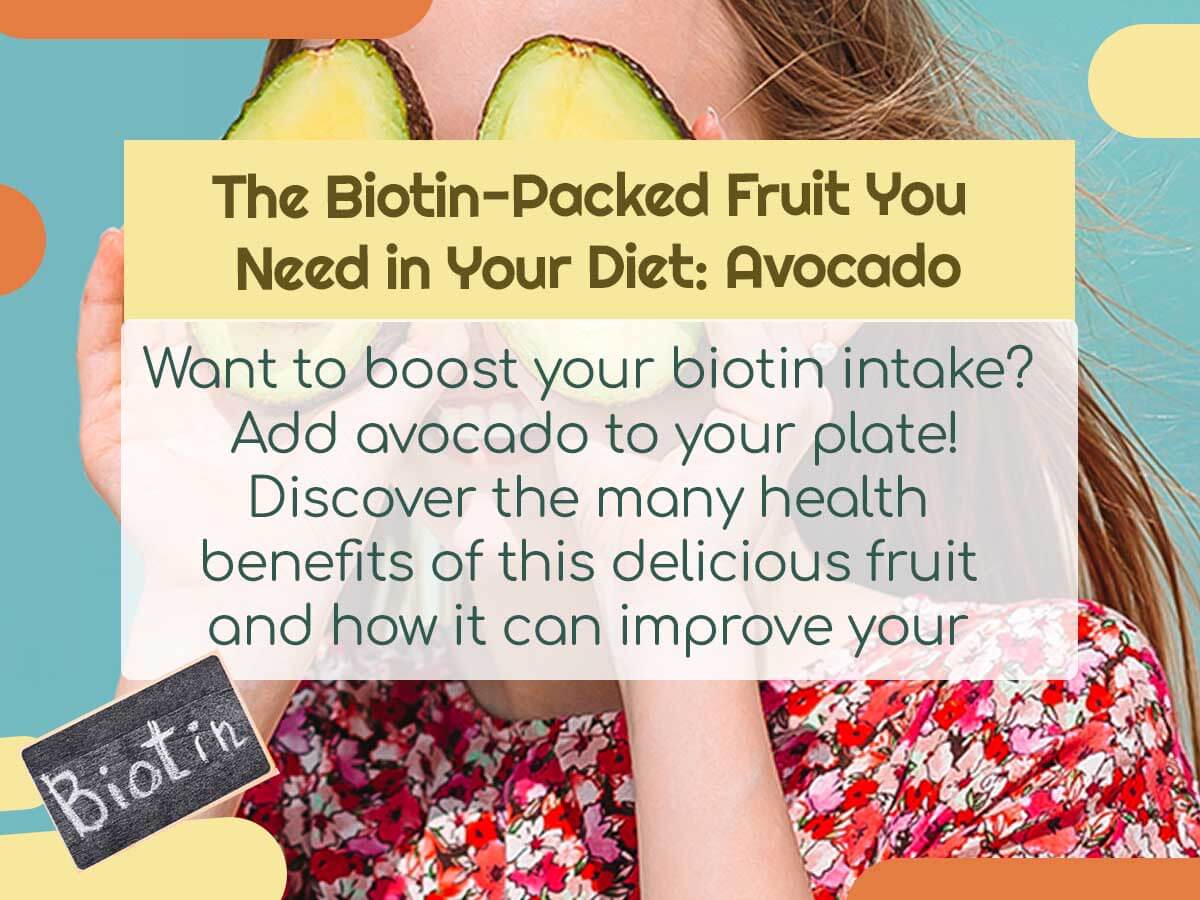
Which fruit is full of biotin?
Fruits are an excellent source of vitamins and minerals, including biotin. Here are some biotin-rich fruits and their biotin content:
Avocado: Avocado is a superfood that is rich in biotin. A medium-sized avocado provides about 2-6 micrograms of biotin . Avocado is also high in healthy fats and fiber, making it a great addition to salads or smoothies.
Berries: Berries like strawberries, raspberries, and blackberries are delicious and packed with biotin. A cup of fresh strawberries contains about 0.2 micrograms of biotin . Berries are also a great source of antioxidants, which can help protect the body against damage from free radicals.
Bananas: Bananas are a good source of biotin, with one medium-sized banana providing about 0.2 micrograms of biotin. Bananas are also high in potassium, which can help regulate blood pressure and improve heart health.
Pineapple: Pineapple is a tropical fruit that is rich in biotin. One cup of fresh pineapple chunks contains about 0.2 micrograms of biotin . Pineapple is also a good source of vitamin C, which can help boost the immune system and improve skin health.
Watermelon: Watermelon is full of biotin (one of the B-complex vitamins) necessary to form healthy hair and nails.
Incorporating these biotin-rich fruits into your diet ensures you get all the essential nutrients your body needs to stay healthy.
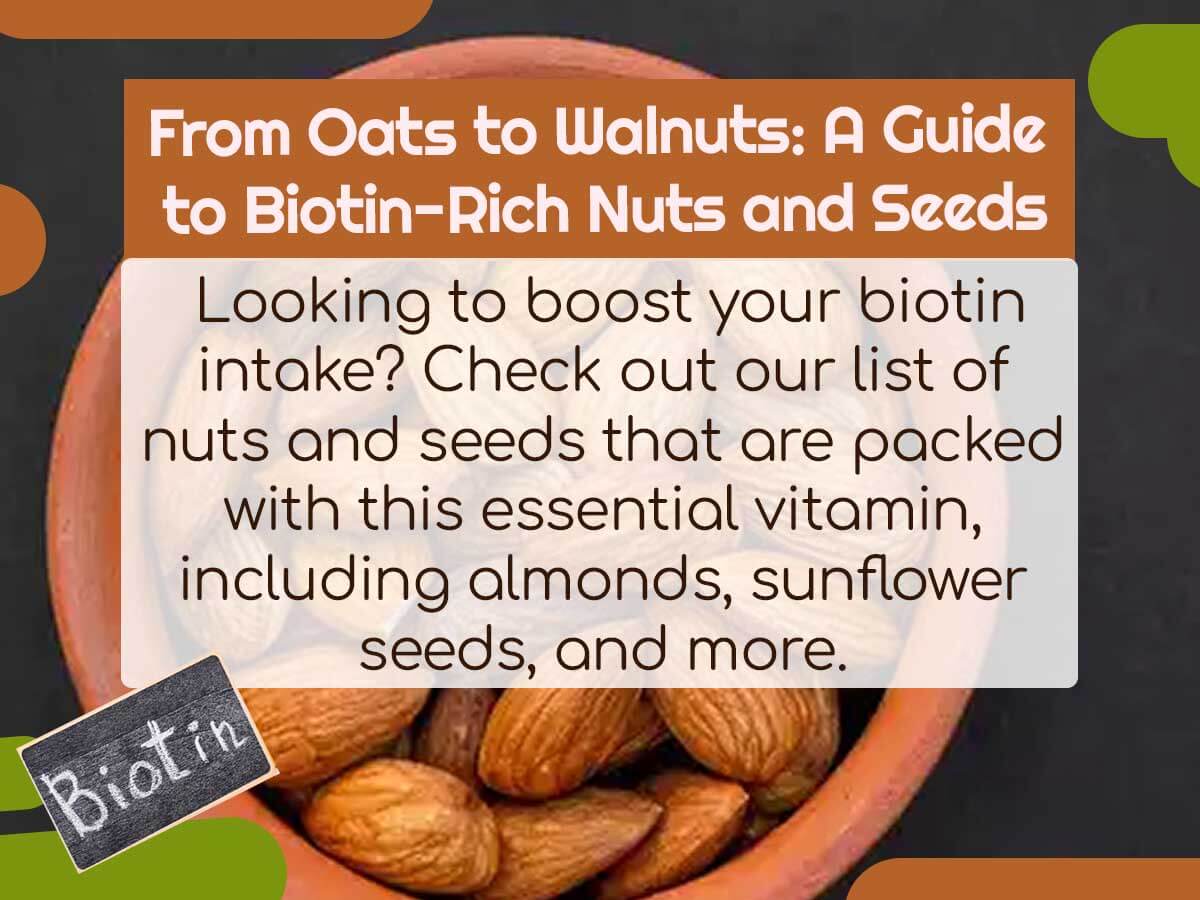
Nuts, seeds, and cereals containing biotin (vitamin B7)
I’ve written a list of biotin-rich nuts, seeds, and grains and their approximate biotin content in micrograms (mcg) per 100 grams.
- Sunflower seeds: 66 mcg
- Almonds: 12 mcg
- Pecans: 28 mcg
- Walnuts: 39 mcg
- Pistachios: 70 mcg
- Flaxseeds: 55 mcg
- Chia seeds: 17 mcg
- Sesame seeds: 14 mcg
- Oats: 26 mcg
- Barley: 35 mcg
- Brown rice: 6 mcg
- Quinoa: 5 mcg
You can easily add these nuts, seeds, and grains to your diet, almonds, walnuts, and pistachios to smoothies, and nuts like flax seeds, chia seeds, or sesame seeds to salads.
Add juicer or quinoa to Etomil for breakfast or a snack.
Reference:
USDA National Nutrient Database for Standard Reference (Release 28, released September 2015)
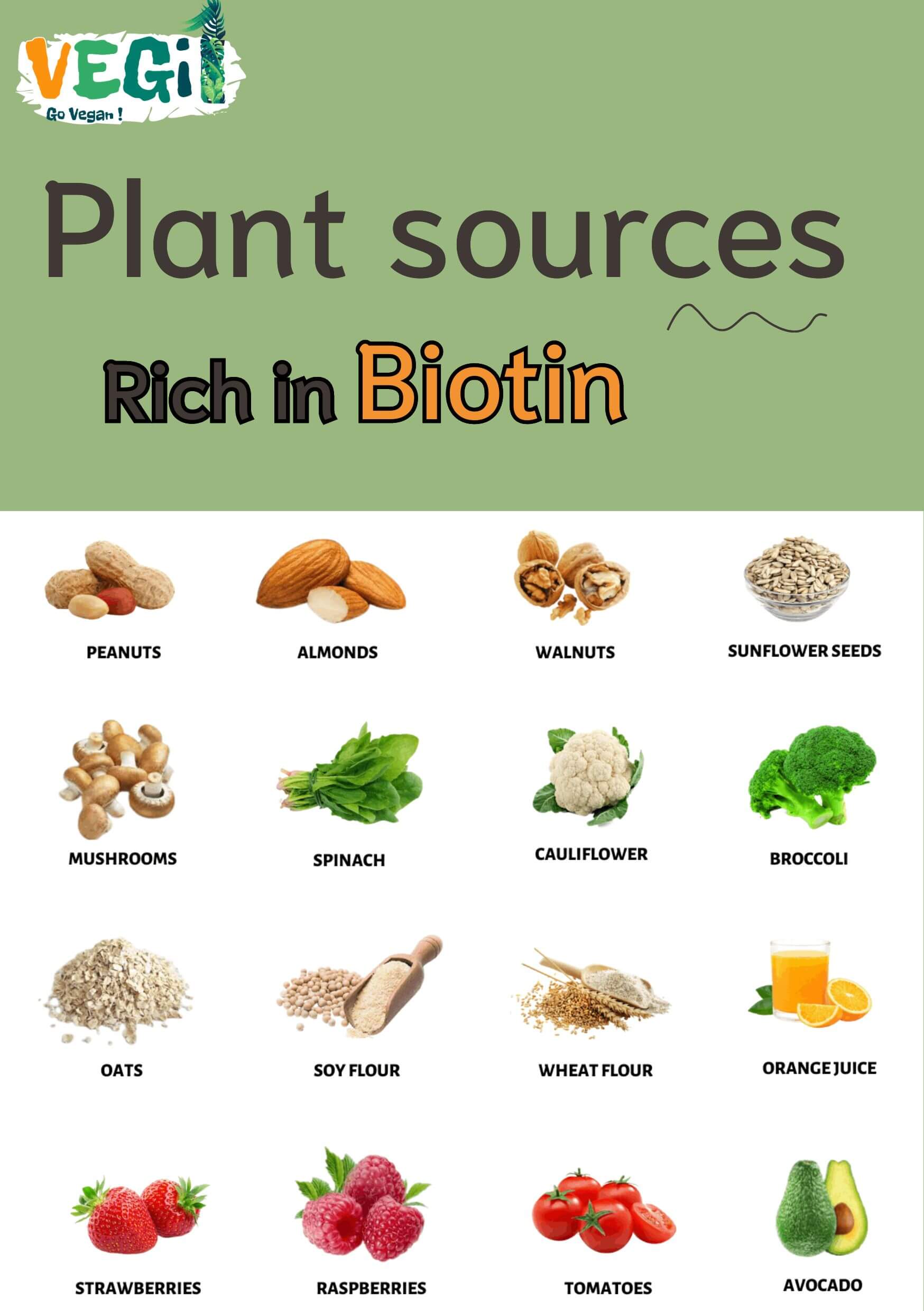
The best Vegetarian sources of biotin that I use
Here, I want to introduce you to the best and most crucial plant biotin sources that I use the most:
Nuts and seeds:
Including almonds, cashews, hazelnuts, pecans, pumpkin seeds, and walnuts.
There is always one of these nuts on the dining table, but when I feel that the amount of biotin in children is low, I add more almonds and hazelnuts to their school meals.
Nutritional yeast:
This is a type of fermented yeast that is rich in biotin and vitamin B12. I add this yeast to ingredients when preparing all kinds of cakes, pancakes, tofu and burgers
Soybeans:
Soybean is rich in biotin and vegetable protein. I make milk from soybeans and add it to cakes and pancakes, or I give soy milk to children as an evening drink, and I also make tofu or burgers with soybeans.
Instead of meat, I use ground soybeans in some Iranian dishes, such as lentil pilaf and green bean pilaf, which are very delicious.
Mushrooms:
I love oyster mushrooms and shiitake mushrooms. These mushrooms have a delicious meat-like taste and impress my non-vegetarian guests.
Mushrooms are rich in vegetable biotin, antioxidants, and polyphenols, and most importantly, they are very tasty.
Pumpkin seeds, avocados, and spirulina are our family’s three secret sources of daily biotin.
If you follow a vegan diet, include these three tasty vegetables in your diet regularly.
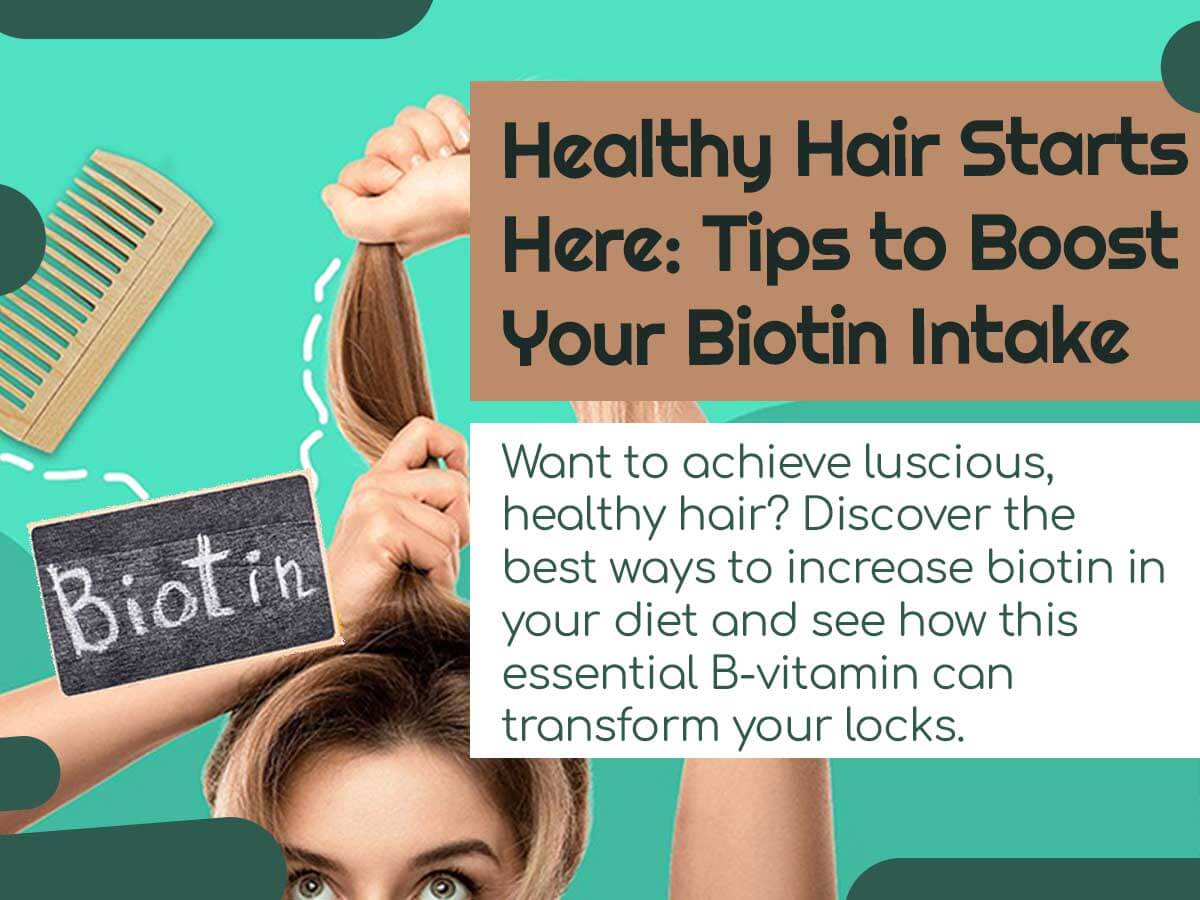
3 Delicious Vegan Recipes Packed with Biotin
Here are three delicious vegan recipes that are also rich in biotin:
Vegan Berry and Flaxseed Smoothie Bowl
This smoothie bowl is packed with biotin-rich flaxseeds and berries, making it a nutritious and delicious breakfast or snack. To make it, blend 1 banana, 1 cup frozen mixed berries, 1 tbsp flaxseeds, 1 tbsp almond butter, and 1/2 cup almond milk until smooth. Pour the mixture into a bowl and top with your favorite toppings, such as more berries, sliced banana, and granola.
Quinoa and Chickpea Salad with Avocado Dressing
This hearty salad is rich in biotin from the quinoa and chickpeas and packed with protein and healthy fats from the avocado dressing. Cook 1 cup of quinoa according to package instructions, then let it cool. Mix 1 can of drained and rinsed chickpeas, 1 diced bell pepper, 1 diced cucumber, and 1/4 cup of chopped fresh parsley in a separate bowl. For the dressing, blend 1 ripe avocado, 1/4 cup olive oil, 1/4 cup water, 1/4 cup lemon juice, and 1 garlic clove until smooth. Toss the quinoa and chickpea mixture with the dressing and serve.
Vegan Sweet Potato and Black Bean Tacos
These tacos are a flavorful and biotin-rich twist on traditional tacos. Roast 2 medium sweet potatoes in the oven until tender, then mash them in a bowl with 1 can of drained and rinsed black beans, 1 diced jalapeño, 1/4 cup chopped cilantro, and 1 tbsp ground cumin. Warm-up 6 corn tortillas, then fill them with the sweet potato and black bean mixture. Top with diced avocado, chopped red onion, and a squeeze of lime juice.
These recipes are not only delicious but also provide your body with the necessary biotin it needs to function correctly.

Here is a table with the biotin content and other important nutrients of the three biotin-rich vegan recipes:
| Recipe | Biotin (mcg) | Protein (g) | Fiber (g) | Vitamin C (mg) | Iron (mg) |
|---|---|---|---|---|---|
| Vegan Berry and Flaxseed Smoothie Bowl | 22 | 6 | 8 | 42 | 1 |
| Quinoa and Chickpea Salad with Avocado Dressing | 5 | 12 | 10 | 41 | 4 |
| Vegan Sweet Potato and Black Bean Tacos | 23 | 10 | 14 | 19 | 3 |
Note: that the biotin values are approximate and based on the USDA National Nutrient Database for Standard Reference. Also, the nutrient content may vary depending on the specific ingredients used in each recipe.
In general, these recipes are not only rich in biotin, but also provide a good source of other important nutrients such as protein, fiber, vitamin C, and iron. These nutrients are essential for various bodily functions, such as muscle growth and repair, digestion, immune system function, and oxygen transport in the blood.

Do I need a biotin supplement?
There are two types of biotin: vitamin B7 (also known as riboflavin) and vitamin B8 (also known as folate). Vitamin B7 helps to make red blood cells, and vitamin B8 helps to make DNA. Both of these vitamins help the body to stay healthy.
Most people get enough biotin through food, but some may need a supplement.
There are two main reasons why you may need a supplement:
- If your diet doesn’t provide enough biotin or has certain health conditions that interfere with your body’s ability to absorb or use it properly.
- If you’ve had cancer treatment (chemotherapy, radiation therapy), which depletes the body of biotin.
Biotin supplements come in different forms: tablets, capsules, and chewable tablets. You can also find them as a topical cream or gel for skin care. Each type has its benefits and uses.
To take a biotin supplement, take one pill or capsule with meals daily. For best results, start with a small dose and increase as needed.
Biotin supplements are not currently recommended by the U.S. Institute of Medicine (IOM) because there is too little evidence to support their use in healthy people. However, some people may benefit from taking biotin supplements if they have specific conditions such as poor eyesight, eczema, or brittle nails. If you have any medical condition, please talk with your doctor before taking a biotin supplement!
The best biotin supplements for vegans
I personally tested these biotin supplements, and the best biotin supplements, in my opinion, are:
Solgar Biotin 5000 mcg:
Give your body the nourishment it needs with this non-GMO, vegan, and gluten-free biotin supplement from Solgar. With 5000 mcg of biotin per 180-count bottle, you can support the health of your skin, nails, and hair while also promoting energy production and metabolism.
Amazon Elements Vitamin B12 :
Double up on your beauty and energy game with this two-in-one supplement from Amazon Elements. Featuring 5000 mcg of vegan biotin and 5000 mcg of vitamin B12 methylcobalamin, these lozenges and capsules respectively provide an easy and tasty way to support your health and wellbeing.
Amazon Elements Vegan Biotin 5000 mcg
Want to revitalize your hair, skin, and nails? Look no further than this vegan biotin supplement, providing 5,000 mcg per capsule for 130 capsules, enough for a 4-month supply. And with Amazon’s rigorous standards for quality and purity, you can trust that you’re getting only the best.
NOW Solutions, Vegan Hair, Skin & Nails:
Achieving a vibrant, healthy appearance has never been more manageable thanks to this vegan supplement. Packed with 5,000 mcg of biotin and other vital nutrients, these veggie capsules support the health of your hair, skin, and nails while providing overall nutritional support.
Sports Research Biotin Supplement with Organic Coconut Oil:
Upgrade your beauty routine with this biotin supplement featuring organic coconut oil for maximum absorption and efficacy. With 5,000 mcg of biotin per veggie softgel capsule, you can support healthy hair, skin, and nails while boosting your energy and metabolism.
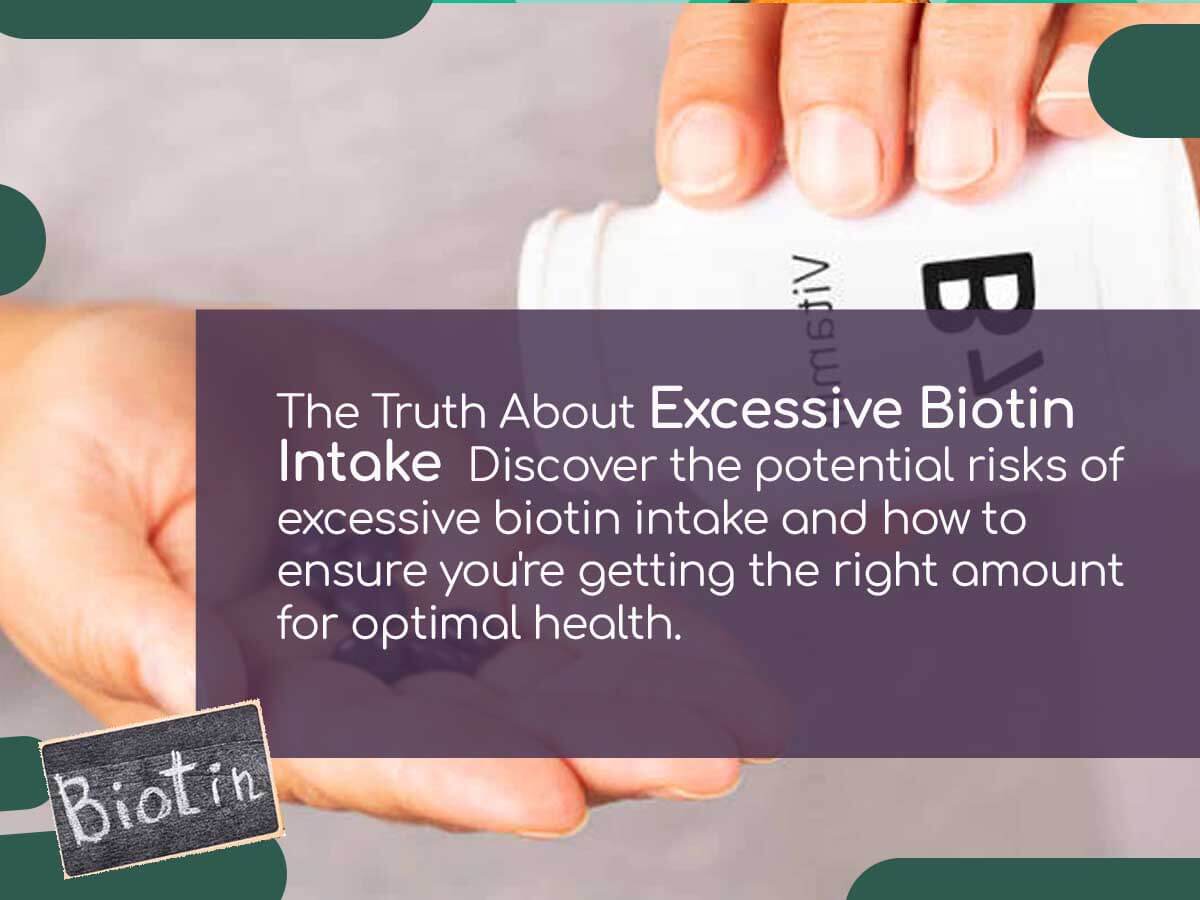
Answers to frequently asked questions
How can I increase biotin in my hair?
Hair loss is a widespread problem worldwide; even vegetarians can experience hair loss!
Hair loss can occur for reasons such as poor diet or genetics. However, you can prevent or treat hair loss by increasing your biotin intake or taking supplements.
Is It Possible To Get Too Much Biotin?
Biotin can be found in many over-the-counter health supplements. Although it is not toxic, some people may be allergic to specific proteins found in certain foods. If you suspect a potential allergy to biotin, consult your doctor before taking any supplements. It is also important to note that supplementation with too much biotin can have side effects such as stomach upset, diarrhea, and nausea.
Generally, the recommended daily biotin intake is between 35-100 mcg (micrograms). In most cases, this amount can be obtained through food alone without supplementing. However, suppose you are taking medication or have an existing medical condition that might limit your ability to absorb nutrients from food sources. In that case, consider supplementing with additional biotin.
What Else Should I Eat To Grow Healthy Hair?
If you’re dealing with a nutritional deficiency, you must ensure you get enough of the essential vitamins and minerals that promote healthy hair growth. In addition to this, several foods can help support healthy hair growth, such as avocados (which contain omega-3 fatty acids), garlic (which helps keep your scalp healthy), and dark chocolate (which has been shown to promote strong hair growth).
Which medications interact with biotin?
As biotin is a water-soluble vitamin, it’s essential to take care when taking medications that are also liquid or water-soluble. Certain medications can react with biotin and alter its levels in the body, which may cause side effects such as headaches, nausea, or diarrhea. When taking medication, you must consult your doctor if you notice any changes in your skin, hair, or nails.
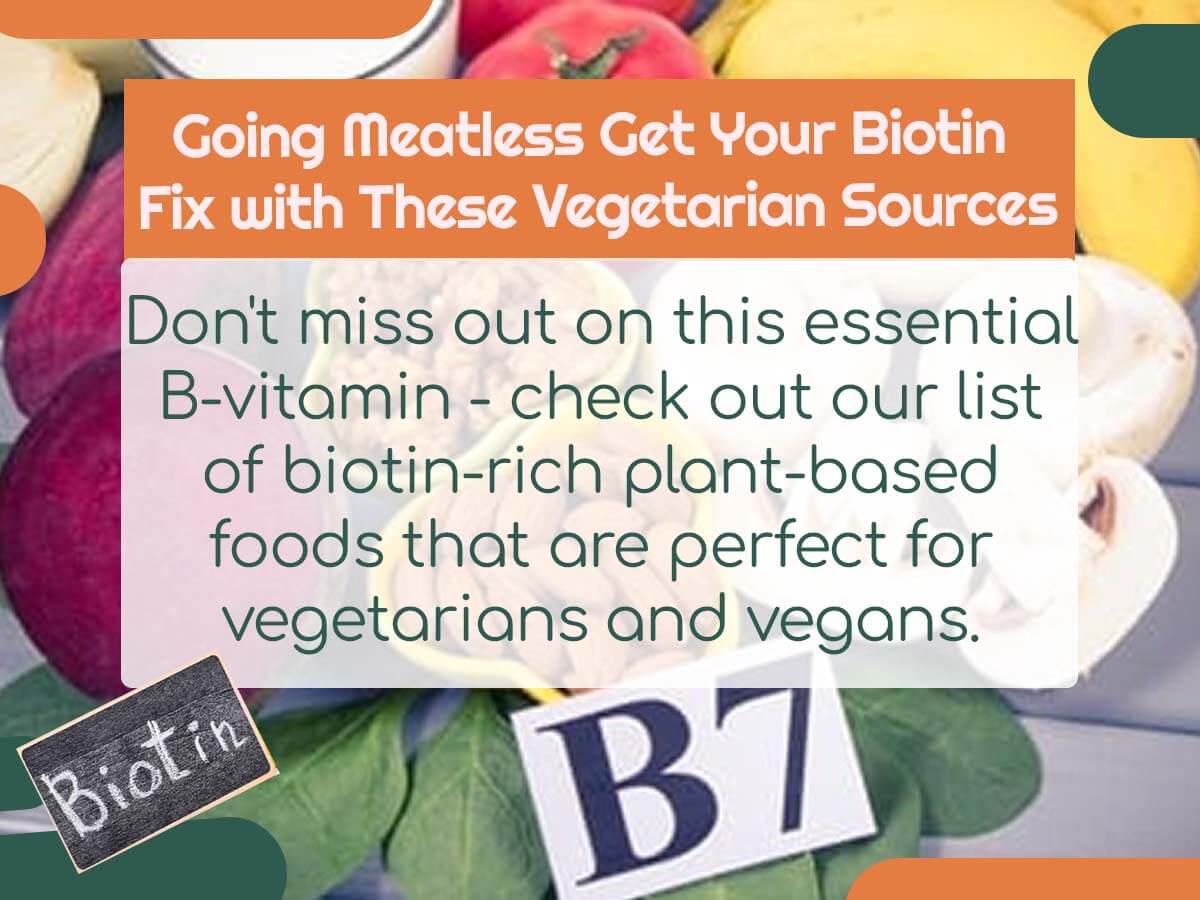
Summary
In conclusion, as a vegetarian, it’s essential to ensure that you’re getting enough biotin in your diet to maintain healthy hair, skin, and nails. Signs of deficiency in vitamin B7(Biotin) might include brittle hair, dry skin, or soft nails. Luckily, there are several plant-based sources of biotin, including vegetables, fruits, nuts, seeds, and cereals. You can also consider taking biotin supplements if needed. Don’t let biotin deficiency affect your overall health and beauty.
Try incorporating more biotin-rich foods into your diet and see the difference it can make.
If you have any questions or suggestions, please leave a comment below.


